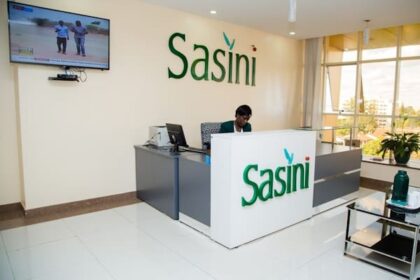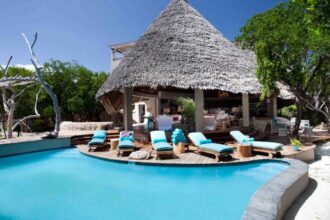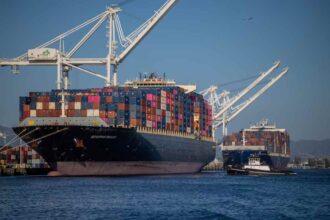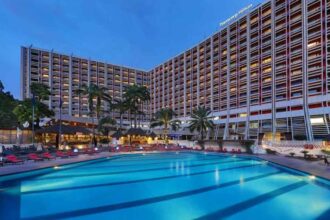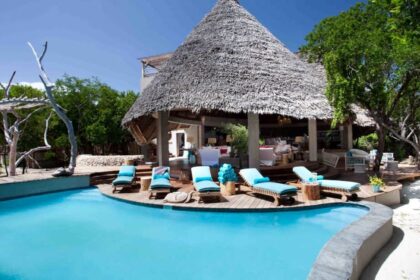At a Glance
- Trump expands U.S. travel restrictions to 10 African nations, citing security concerns.
- Visa bans impact students, families, entrepreneurs, and medical seekers.
- Policy deepens U.S.-Africa tensions as aid cuts and migration curbs reshape relations.
As the world watches Donald Trump return to the global stage, his policies are once again reshaping America’s relationship with Africa, this time through the lens of immigration.
Shortly after aid cuts under his administration began to bite, leaving some African countries without a single dollar of US support, Trump has introduced a sweeping new travel policy that further tightens the door on the continent.
In a move that’s already sparking diplomatic concern and uncertainty for families, students, and businesses, the Trump administration has expanded its travel restrictions to include a dozen nations. Seven of those are African. In addition, visa limitations have been placed on three more African countries, bringing the total number of affected nations on the continent to ten.
This expanded directive, laid out in a presidential proclamation, cites national security and the need for stricter vetting procedures. Trump pointed to a recent attack in Boulder, Colorado, linked to an individual who had overstayed a visa, as a trigger for the new measures. “We cannot have open migration from any country where we cannot safely and reliably vet and screen those who seek to enter the United States,” he said.
The full list of countries facing complete bans includes Afghanistan, Myanmar, Chad, Republic of the Congo, Equatorial Guinea, Eritrea, Haiti, Iran, Libya, Somalia, Sudan, and Yemen. Partial restrictions will apply to another seven nations, including Burundi, Cuba, Laos, Sierra Leone, Togo, Turkmenistan, and Venezuela.
For the ten African countries caught in the middle, the consequences go beyond the symbolic. These bans impact real people, students accepted into US universities, families trying to reunite, entrepreneurs with plans to attend tech summits, and patients seeking specialized medical care. It also reflects a broader trend: the narrowing of immigration pathways for citizens of countries that already face economic and political headwinds.
In the list below, Shore.Africa takes a closer look at ten African countries currently facing travel restrictions. We explore what defines each nation, along with the recent crises, political tensions, and human rights concerns that have brought them into the spotlight.
- Chad
Chad, a landlocked country in north-central Africa, has struggled with political instability and conflict since gaining independence from France in 1960. Most recently, it has faced violence involving Islamist group Boko Haram. The country is currently led by President Mahamat Déby, who took power in 2021 after the death of his father, Idriss Déby, a long-time ruler killed during clashes with rebels. In December, Chad held parliamentary elections, which the government promoted as a step toward transitioning from military to civilian rule. However, opposition groups boycotted the vote, citing fears of electoral fraud. Chad previously hosted a French military base, which supported regional counter-terrorism operations. But in November, Chad ended its defense agreement with France, a move government spokesman Abderaman Koulamallah said was about reclaiming full national sovereignty. Like its neighbors in the so-called “Coup Belt,” which includes Mali, Niger, Burkina Faso, and Sudan, Chad has seen a rise in military influence over governance in recent years.
- Republic of the Congo
To the southwest, the Republic of the Congo, also known as Congo-Brazzaville, is sparsely populated, with just under 15 people per square kilometer. With a population of over six million, many of them under 15 years old, it faces the twin challenges of managing rapid growth and creating opportunities for its young citizens. This year, the country signed a Comprehensive Economic Partnership Agreement (CEPA) with the United Arab Emirates. The deal is expected to boost trade between the two nations to over $7.2 billion by 2032 and position the UAE as a key supply chain hub linking Africa with Europe, Asia, and the Arab world.
- Equatorial Guinea
Equatorial Guinea, located on Africa’s west coast, has long struggled to turn its oil wealth into broader prosperity. Since oil was discovered in 1995, the country has become one of sub-Saharan Africa’s top producers. But that wealth has largely benefited the political elite, while much of the population continues to live in poverty. The country, split between the mainland region of Río Muni and several islands including Bioko, where the capital Malabo is located, is often cited as an example of the “resource curse.” President Teodoro Obiang Nguema, who took power in 1979 after toppling his uncle’s brutal regime, is Africa’s longest-serving leader. Rights groups continue to document widespread corruption, repression, and abuse under his rule. His son, Teodorin Nguema, has faced multiple corruption-related convictions abroad, with assets seized in France, the U.S., and Switzerland. Those funds, in theory, are to be redirected to benefit the people of Equatorial Guinea—but critics say little has changed on the ground.
- Eritrea
Across the continent in the Horn of Africa, Eritrea remains one of the most closed and repressive countries in the world. After winning independence from Ethiopia in 1993, the country has endured decades of authoritarian rule under President Isaias Afewerki. Eritrea’s government has maintained tight control over nearly every aspect of public life, justifying its policies with the ever-present threat of renewed conflict with Ethiopia. Although hostilities formally ended in 2018, the country remains highly militarized. Human rights groups report widespread abuses, including indefinite national service, forced labor, and mass surveillance. Eritrea has no independent media or judiciary, and those who attempt to flee often face severe punishment, not just for themselves but also for their families. The situation has led hundreds of thousands to risk dangerous journeys across the Sahara and the Mediterranean in search of safety and opportunity.
- Libya
Libya, sitting along the Mediterranean in North Africa, continues to wrestle with the aftermath of its 2011 revolution. Fragmented power structures and competing militias have undermined any sustained effort at rebuilding national governance. The latest evidence of this breakdown came with the discovery of dozens of bodies in areas of Tripoli once controlled by the Stabilisation Support Apparatus (SSA), a militia whose leader was killed during recent clashes. The United Nations has expressed alarm over reports of torture, abuse, and potential extrajudicial killings at SSA-run detention centers. UN rights chief Volker Turk described the findings, charred bodies, suspected instruments of torture, and mass graves, as deeply disturbing. Some 67 corpses were found in hospital morgues, and another burial site was reportedly uncovered in the Tripoli Zoo. Investigations are ongoing, but the victims’ identities remain unknown. The situation reflects Libya’s broader challenges in restoring rule of law, protecting human rights, and establishing accountability.
- Somalia
Somalia, the easternmost country on the African continent, sits at a strategic crossroads between sub-Saharan Africa and the Arabian Peninsula. Its capital, Mogadishu, lies just north of the Equator along the Indian Ocean. The country continues to face a severe and prolonged humanitarian crisis, worsened by years of drought, conflict, and widespread food insecurity. From 2021 to 2023, Somalia experienced its worst drought in four decades, pushing millions into hunger and forcing many from their homes. Armed clashes between Somali Security Forces and Al-Shabaab remain a constant threat, leaving civilians caught in the crossfire. Sexual and gender-based violence remains rampant, with survivors rarely receiving justice. In Somaliland, authorities have further tightened restrictions on free expression, the press, and civil society, deepening the region’s isolation.
- Sudan
Sudan’s crisis has grown even more dire. The ongoing conflict between the army and the paramilitary Rapid Support Forces has killed an estimated 15,000 people and displaced over 11 million more. The violence has devastated the economy, causing a steep 37.5% decline in GDP in 2023. Production has ground to a halt, and inflation has made daily life almost unbearable. Earlier this week, a UN aid convoy was attacked near el-Koma in North Darfur, killing five workers and injuring several others. The RSF and government forces have traded blame, but the UN has called for a swift investigation. As fighting continues to spread, the humanitarian toll mounts, and the prospects for peace remain bleak.
- Burundi
Burundi, a small, landlocked country in East Africa, has seen only modest gains since the end of its civil war. With a complex history shaped by deep-rooted ethnic divisions, the country continues to struggle with political repression and limited freedoms. President Évariste Ndayishimiye’s rise to power in 2020 brought some optimism, but little has changed in practice. The ruling party remains firmly in control, while reports of arbitrary arrests, enforced disappearances, and harassment of the opposition persist. Independent media and civil society groups face constant pressure. Though a handful of journalists were released in 2020, others, especially human rights defenders, are still imprisoned, despite ongoing calls for reform.
- Sierra Leone
In Sierra Leone, a fragile peace holds two decades after the end of civil war. While the country has held five peaceful elections and enjoys a reputation for religious tolerance, its political divisions remain stark. Tensions flared again during the 2023 elections, prompting the government and opposition to reach a unity agreement aimed at calming unrest. President Julius Maada Bio was declared the winner, though the opposition APC contested the result, alleging irregularities. The next general election is still years away, but observers warn that simmering political grievances could reignite unrest if left unaddressed. Despite these challenges, Sierra Leone was ranked the eighth most peaceful country in Africa in 2024, a reflection of its broader efforts to maintain stability and limit foreign intervention.
- Togo
Togo, a narrow West African nation on the Gulf of Guinea, has long faced criticism over its democratic record. Since gaining independence from France in 1960, the country has been dominated by one family. Faure Gnassingbé has ruled since 2005, following the 38-year presidency of his father. While elections have been held, opposition parties have consistently challenged their legitimacy, citing fraud and voter intimidation. In 2024, the country adopted a new constitution that shifts Togo from a presidential to a parliamentary system. Supporters of the move claim it will reduce presidential powers, but critics argue it is a thinly veiled attempt to extend Gnassingbé’s hold on power. Under the new system, he could remain in office until 2031, and possibly transition to an even more powerful role as head of government.


